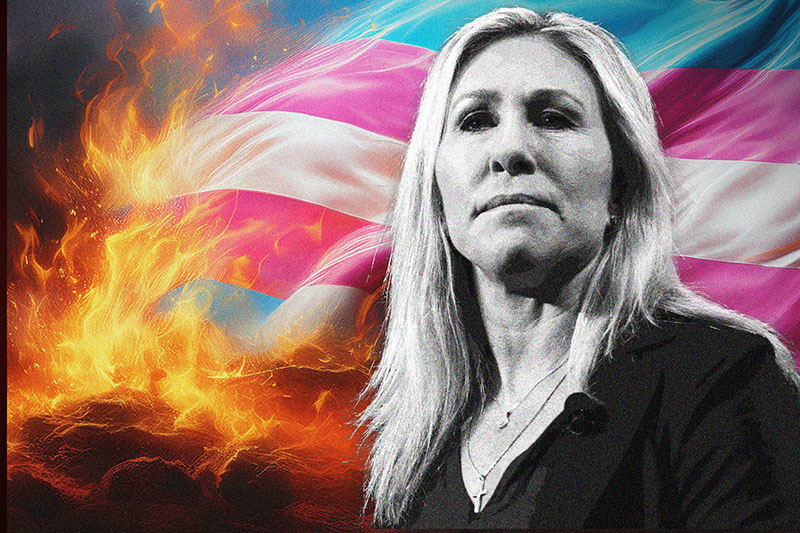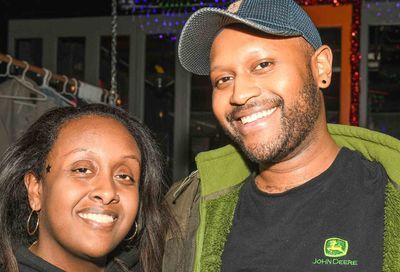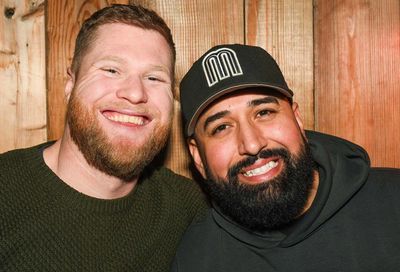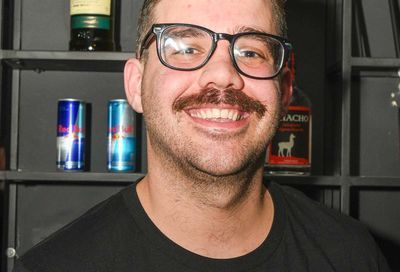From the Supreme Court Forward
What Was & What's Next for the Marriage Equality Movement
FORWARD THINKING

Edith Windsor speaking outside of the Supreme Court
(Photo by Justin Snow)
When Edie Windsor embraced the crowd of marriage-equality supporters after oral arguments in the DOMA case, it signaled the start of what will likely be more than two months of anxious waiting.
The Supreme Court is not expected to issue a ruling in either case until mid-June, before its summer recess. What the justices decide will be a tightly guarded secret until those opinions are issued. And unlike other branches of government, the Supreme Court does not leak.
Few are willing to predict how the Supreme Court will rule in the two cases. During oral arguments in the DOMA case, the apparent skepticism of a majority of the justices regarding the 1996 ban on federal recognition of same-sex marriage indicates its days may be numbered. (As Justice Ruth Bader Ginsburg put it, Section 3 of DOMA creates separate classes of marriage: “full marriage, and then this sort of skim milk marriage.”)
Few, however, felt as confident about the justices’ reactions to the broad arguments of a constitutional right to marry, put forth by Theodore Olson, the conservative half of the star legal duo leading the charge against Proposition 8.
All eyes were also on swing Justice Anthony Kennedy who, while appearing poised to argue DOMA should be struck down as an overreach of federal power, expressed skepticism to a sweeping ruling in the Proposition 8 case.
“There is an immediate legal injury or legal — what could be a legal injury, and that’s the voice of these children,” said Kennedy. “There are some 40,000 children in California … that live with same-sex parents, and they want their parents to have full recognition and full status.”
Nevertheless, Kennedy said that information regarding how children are impacted by being raised in a household with two parents of the same sex is too new to be definitive. “We have five years of information to weigh against 2,000 years of history or more,” Kennedy said.
Many point to Kennedy’s 2003 majority opinion striking down a Texas anti-sodomy law in favor of two gay plaintiffs as a hint as to how he might rule.
”The petitioners are entitled to respect for their private lives,” Kennedy wrote, fueling many of the legal battles for LGBT equality that have persisted in the years since. ”The State cannot demean their existence or control their destiny by making their private sexual conduct a crime.”
Justice Antonin Scalia, writing the dissenting opinion, accused the court of signing onto the ”so-called homosexual agenda” directed at ”eliminating the moral opprobrium that has traditionally attached to homosexual conduct.”
Perhaps presciently, Scalia added, in part, ”If moral disapprobation of homosexual conduct is ‘no legitimate state interest’ … what justification could there possibly be for denying the benefits of marriage to homosexual couples?”
As the long wait begins, advocates who have seen the trajectory of public opinion change dramatically in just a few short years, say this is not the time for complacency.
“This argument was obviously lively and choppy and engaged and I think rather than sitting around handwringing and speculating, what we need to do is go out and continue creating that momentum that’s going to get us there,” Wolfson said after arguments in the Proposition 8 case. “We have four states we can win if we do our work right over the next few months and others shimmering within reach and we have more people to persuade and bring on board.”
According to Wolfson, ”The strategy that has brought us to this moment of hope is the strategy that will bring us the freedom to marry nationwide, whether in June or in the round of work leading to going back before the court as soon as possible.” Wolfson promised that marriage-equality will be back if the high court gets it wrong in either of the cases. Noting the Supreme Court’s 1967 decision in Loving v. Virginia, which declared that laws restricting interracial marriage violated both the Due Process Clause and the Equal Protection Clause of the 14th Amendment and reversed previous court rulings, Wolfson said the Supreme Court got interracial marriage wrong before it got it right.
It is a sentiment echoed by nearly everyone who has seen momentum for marriage equality increase to epic levels in such a short period. The Human Rights Campaign and Freedom to Marry continue to devote financial resources and energy to the states considering same-sex marriage legislation.
”Now what we can do is wait and of course continue to have the conversation with the American public that this case has brought about a phenomenal opportunity with Ted and David and these plaintiffs to have a national conversation,” said Human Rights Campaign President Chad Griffin. ”And we’ve seen what happens when you have that national conversation.”
As the co-founder of the American Foundation for Equal Rights, Griffin spearheaded the suit against Proposition 8 in 2009 and personally recruited Olson, the former solicitor general for President George W. Bush, and David Boies. The conservative Olson and liberal Boies faced each other on opposing sides in 2000 when they argued Bush v. Gore before the Supreme Court. Olson told reporters his teaming up with Boies was “intended to make the point to America that this is not a Democratic issue or a Republican issue, conservative or liberal, this is an issue of American constitutional rights.” And as that unlikely pair symbolizes, times and minds have changed since DOMA and Proposition 8 became law.
When DOMA was approved, it had little impact as no state recognized same-sex marriages. That changed in November 2003 when the Massachusetts Supreme Judicial Court ruled there was no rational basis for the state to deny same-sex couples the right to marry. DOMA now denies same-sex couples more than 1,000 federal rights and benefits enjoyed by straight couples. President Clinton himself has called for the repeal of the discriminatory law, which bears his signature.
When California voters approved Proposition 8 in November 2008, taking away same-sex couples’ right to marry after California courts had already granted that right months earlier, it was one chapter in a long history of defeats for marriage equality at the ballot box. On Election Day four years later, voters in three states — Maryland, Maine and Washington — approved same-sex marriage. Today, nine states and D.C. permit same-sex couples to wed.
That cultural and political reality is not always apparent inside the marble hallways and behind the red-velvet curtains of the Supreme Court, but it was during these two historic cases.
Although some wondered what language might be used by some of the more conservative members of the court – including Scalia, who is well known for his off-the-cuff remarks – the discussion was respectful. At most, conservative members of the court questioned if it was best for children to be raised by two parents of the same sex.
Dustin Lance Black, the Oscar-winning screenwriter of Milk who has been involved in the fight against Proposition 8 since the start, said that tone was likely connected to a shift in the country caused by more people coming out, just as Harvey Milk urged.
“If I had to guess, I’d say everyone up there knows someone who is gay or lesbian now,” Black said of the justices. “And so they’re learning about us and they don’t want to be hurtful to people who are in their family or they work with, and so I think a lot of people are learning to be much more kind to their LGBT brothers and sisters and learning what is hurtful and not hurtful.”
In fact, among those seated in the section reserved for guests of Chief Justice John Roberts during Tuesday’s arguments was 48-year-old Jean Podrasky — a lesbian from San Francisco and Roberts’s cousin.
Speaking to reporters on the steps of the Supreme Court, Edie Windsor, who for decades lived life in the closet, expressed a sense of relief and optimism for June’s ruling.
”I didn’t feel any hostility, okay, or any sense of inferiority, you know, ‘What do these people want?”’ Windsor said of the justices’ attitudes. ”I felt we were all very respected. And I think it’s going to be good.”
Support Metro Weekly’s Journalism
These are challenging times for news organizations. And yet it’s crucial we stay active and provide vital resources and information to both our local readers and the world. So won’t you please take a moment and consider supporting Metro Weekly with a membership? For as little as $5 a month, you can help ensure Metro Weekly magazine and MetroWeekly.com remain free, viable resources as we provide the best, most diverse, culturally-resonant LGBTQ coverage in both the D.C. region and around the world. Memberships come with exclusive perks and discounts, your own personal digital delivery of each week’s magazine (and an archive), access to our Member's Lounge when it launches this fall, and exclusive members-only items like Metro Weekly Membership Mugs and Tote Bags! Check out all our membership levels here and please join us today!

























